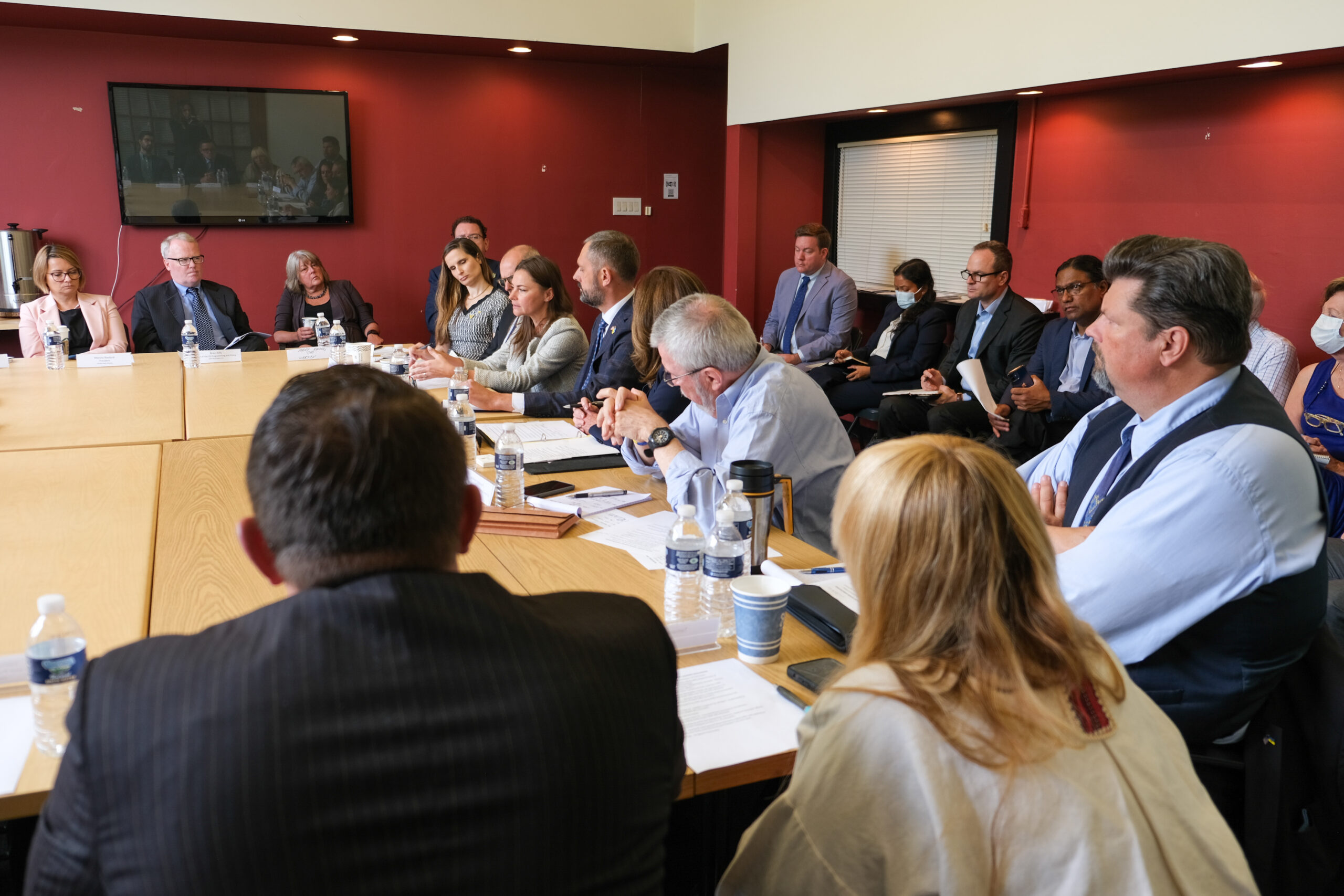
- admin
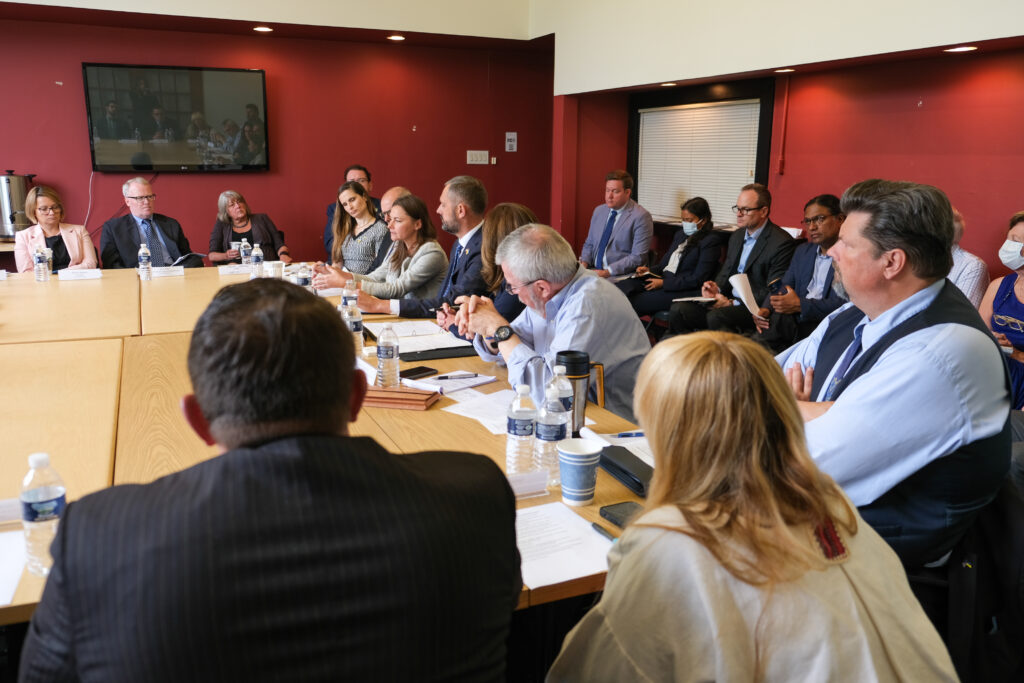
Creating Sustainable Solutions to Recovery with the Ukrainian Diaspora
Ukrainians across the United States are determined to build a better future for their home country.
Beyond providing lifesaving aid since the start of the war, Ukrainian-Americans seek long-term solutions on the road to recovery. Together with partners, the International Organization for Migration (IOM), USA for IOM, and the U.S. Government are actively providing support to the needs on the ground and are prioritizing the innovative strategies being created to fill humanitarian gaps.
As part of their Diaspora Voices and Ukraine Partnership Series initiatives, the U.S. Department of State’s Office of Global Partnerships (GP) held a roundtable event on September 13th with U.S.-based Ukrainian diaspora organizations. The event was a collaboration between GP, IOM, USA for IOM, USAID, and the Ukrainian Embassy in the United States, with the Ukrainian Educational and Cultural Center (UECC).
During the event at the UECC in Jenkintown, Pennsylvania, the Ukrainian diaspora’s vital contributions supporting communities affected by the ongoing war were recognized. The discussion focused on the strengths and experiences of the diaspora organizations, the capacities of government and nongovernmental actors to help sustain existing efforts, continued collaboration and mutual long-term goals for Ukraine. The need to strengthen private sector engagement was recognized as essential to creating long-term solutions.
The critical importance of local actors was emphasized, as was the need for Ukrainians to ‘take back the narrative’ of the war and to tell the personal stories of those affected. Donations have decreased dramatically since the first months of the war, and by showcasing the direct human impact and stories of resilience, the attendees are hopeful the American public will understand why support to populations affected by the conflict continues to be a priority.
The Ukrainian organizations present at the event have extensive experience in providing humanitarian assistance to Ukraine, including sourcing and sending medical kits and other supplies, and traveling to Ukraine themselves to provide direct support to hospitals, schools and other local organizations. These powerful civil society groups are highly motivated to coordinate with large-scale actors to most effectively support ongoing programs that benefit Ukrainian communities.
With over 5.1 million internally displaced persons in Ukraine, there are multiple urgent challenges to be addressed. Roundtable participants discussed steps to recovery, including rebuilding infrastructure, and addressing the collective trauma of Ukrainians and post-traumatic stress disorder, which is widespread.
Since the start of the full-scale war in Ukraine, IOM has refocused its programs and projects, and from February 2022 to March 2023 reached close to three million people with humanitarian support that includes provision of non-food and hygiene items; water, sanitation and hygiene support; multipurpose cash; emergency health and mental health and psychosocial support; assistance to collective centers; protection and other types of support. IOM’s Mission in Ukraine further fights trafficking in human beings, assists the Government in dealing with irregular migration, improving its migration management system, and creating migrant-inclusive health practices and policies. Click here to learn more about IOM’s work in Ukraine.
More than 463,000 people affected by the Ukraine conflict have received multisectoral support through USA for IOM support to IOM’s emergency response. The response focuses on providing shelter, healthcare, cash assistance and immediate basic needs for conflict-affected populations. These include IDPs, host communities and stranded third-country nationals.
IOM engages with diaspora communities globally as part of the 3E Strategy of Engaging, Enabling and Empowering diasporas. To meet the increasing needs arising from multiple crises worldwide, IOM’s work with diasporas not only expands the reach of humanitarian action but leverages their skills and networks, puts agency back into the hands of affected communities, and helps to build more sustainable, long-term solutions to crisis situations.
To learn more about opportunities to partner, contact USA for IOM at usaforiom@iom.int or IOM Ukraine at SMUKRcfm@iom.int. To learn more about IOM’s work and initiatives with diasporas, contact IOM Washington’s Diaspora Engagement Unit at diasporaforhumanity@iom.int.
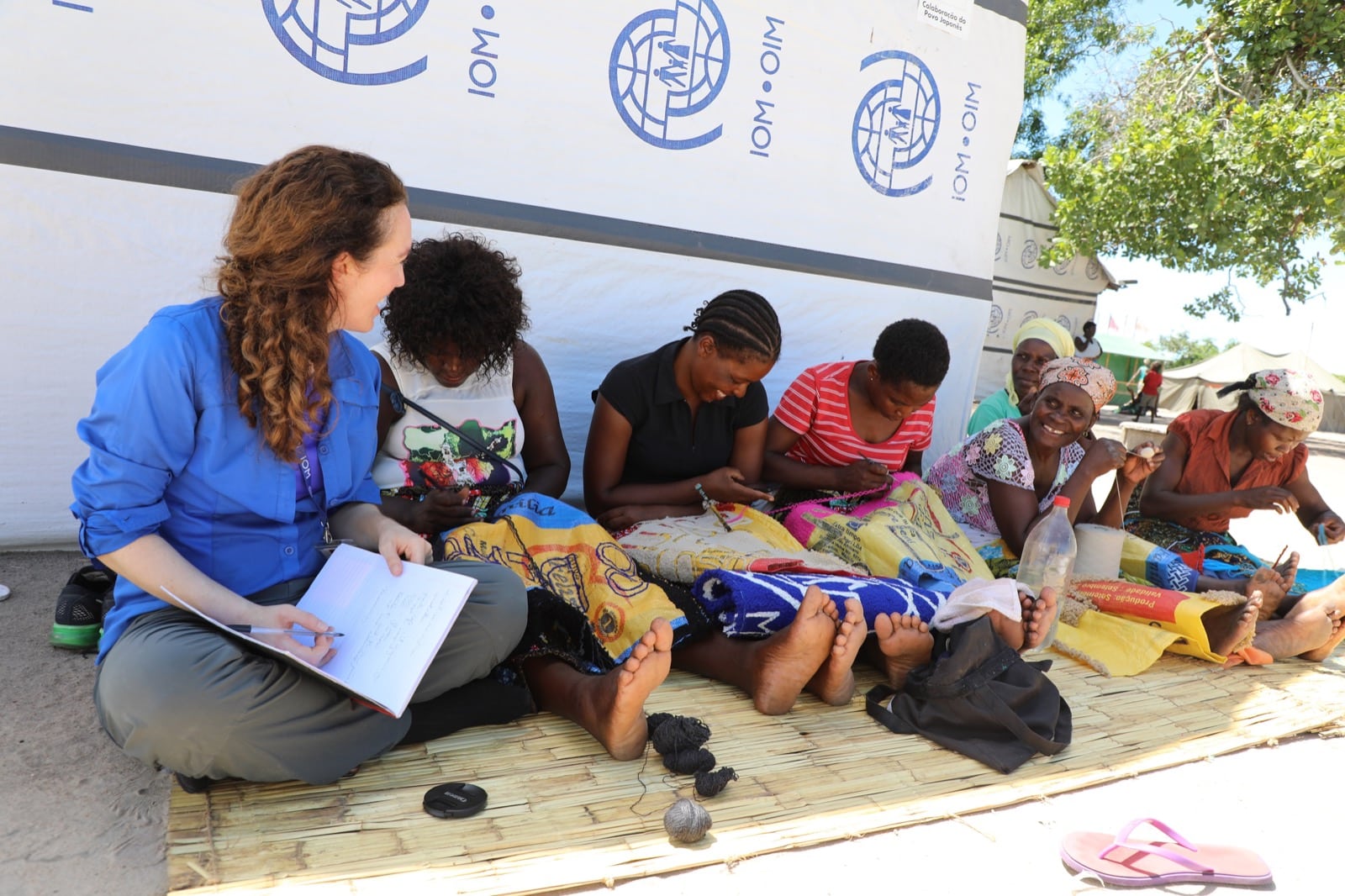
Six Steps to Commemorate World Humanitarian Day
- Sandra Black
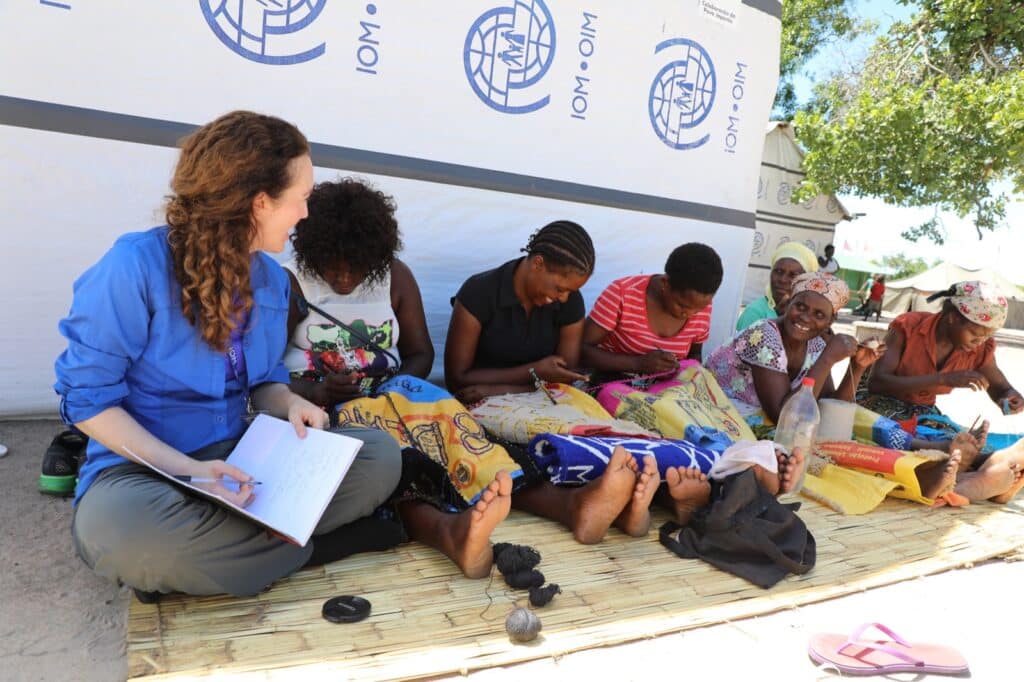
Sandra Black interviews livelihood project participants at displacement site in Central Mozambique.
Six Steps to Commemorate World Humanitarian Day
Anniversaries are a time for both celebration and reflection. World Humanitarian Day 2023 marks 20 years since the attack on UN Headquarters in Baghdad, Iraq. This 19 August, USA for IOM honors those who we work with to meet humanitarian needs globally, #NoMatterWhat.
Echos of the Baghdad bombing persisted when I began working at IOM Iraq in 2014. As a communications officer, my role was to bring attention and expand resources to crisis situations. I share this story, on this day, not only to stand with my fallen colleagues, but also to remind everyone how they can stand with humanitarian workers worldwide.
Recognize the challenges
What does it mean to work in conflict situations, natural disasters and post-conflict zones? I remember from my time in Iraq and Central African Republic.
- – The bullet holes in the car door of the mission I had originally planned to join;
- – A week spent indoors to avoid violent protests, and calling home to say, “Yes Mom, everything’s fine.”;
- – Being called on a Wednesday; Could I depart for another continent’s disaster zone by Friday? Yes, of course.
The humanitarian field experience demands working at full-speed on life-saving tasks, often with intermittent internet and electricity. In most cases as humanitarian workers we have adequate shelter, food, employment, and an organization looking out for us. However, we are faced with daily reminders that those who we support may have lost these entitlements. This work is a labor of love and an exercise in actionable compassion.
- Recognize the needs.
When humanitarian organizations say, ‘resources are stretched’, it’s true. We witness those needs in the faces of people in need, who must stand aside humanitarian distribution lines that can only provide for those in greatest need. And even for those who do receive assistance, a displaced grandmother and grandchild whom I met, the resources provided may not even be sufficient for them to set up an adequate shelter. During crisis a full range of assistance is required.
I recall one occasion, at a food distribution for displaced families cornered in a conflict zone, supplies were inadequate. A displaced woman looked at me and said, “If this is the best you can do, we thank you. Is this the best you can do?” Humanitarian resources can rarely provide for all those in need. These situations are painful and uncomfortable for humanitarian workers.
- Uphold compassion.
In conflict-affected areas, stories shared by displaced families followed a pattern: hearing explosions, fleeing home, surviving in displacement. As displacement figures climb into the millions, the challenge is to not let our compassion fatigue. How do we uphold compassion? By recognizing individuals and their humanity.
I remember the grateful smiles of displaced individuals who were provided with transportation to reunite with family. And the women in Mozambique, rescued from floods by boat and helicopter, who sang in the bus on the way back home; their joy was contagious.
- Encourage and invest in staff.
Well-run humanitarian efforts require investment. Staff training and adequate supplies and preparation are essential.
I remember the Chadian staff member with whom I fled an explosion that targeted the displaced people we were assisting. He was faster than me, but he maintained my pace and held my hand as we ran. Our efforts only succeed when staff are given the support they need, just as he gave me support that day.
- Remember colleagues.
I salute my colleagues who are working in crisis zones, including Ukraine, Sudan, and Democratic Republic of the Congo. “I simply couldn’t remain passive… I wanted to join a humanitarian mission and contribute my best to aid Ukraine,” said Mykyta, an IOM Ukraine non-food item team member.
Humanitarian workers are there to serve, despite and because of the risks that are putting other human beings in danger.
This World Humanitarian Day we keenly remember those whose lives were lost in humanitarian service. We honor their memory with determination to provide enhanced support in times of crisis.
- Support the cause.
I remember the pride of displaced women in Iraq who used donated equipment to set up hair salons to support their families. In visiting refugee camps and displacement sites I consistently encountered nice, normal people who just happened to have been forced to flee their homes. People who aim to improve their situation, and who can rebuild their lives and thrive when provided with adequate assistance.
The theme of World Humanitarian Day 2023 is: ‘No Matter What’. No matter the danger, the hardship, the hostilities… what matters is that we make a difference.
Following several years working in crisis contexts, I am now supporting USA for IOM, continuing to bring attention and resources to IOM’s humanitarian work. I am proud of the spirit of philanthropy in my home country, the United States, and the support offered to those in crisis. Please join humanitarians in standing shoulder to shoulder with the communities we serve #NoMatterWhat.
About the author
Sandra Black has worked for UN Agencies and humanitarian organizations in Iraq, Timor-Leste, Central African Republic, Mozambique, Senegal and Brazil. She is now the Lead Communications Officer with USA for IOM, the non-profit partner in the US of the International Organization for Migration (IOM).
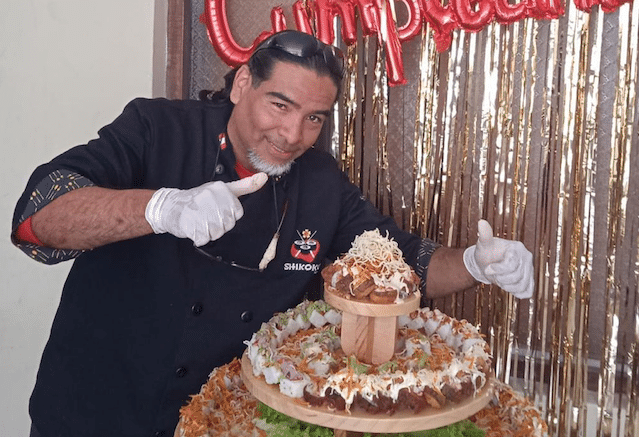
- admin

Jose: "My job is to create dishes that fusion cultures."
José Antonio Bustamante Ortuño is an accountant who managed restaurants in Venezuela. For three years now, he has created a true fusion of cultures through recipes and original meals from his business: Cheo Fast Food.
José is convinced that sometimes life guides us on a path quite different from the one we envisioned, but these detours can lead us to our true destiny. Fifteen years ago, he achieved a seemingly impossible goal, moving to Australia where he unexpectedly ended up studying international gastronomy. This training served him in ways he had never imagined when he decided to migrate to Peru with his family. Although he anticipated challenges establishing his food business, the most difficult obstacle would be having to start over as he adjusted to a new culture. “Thanks to IOM”, he tells us, “I was able to sustain the business and move forward. They helped me and trained me to promote my entrepreneurship, because due to the pandemic, my business was paralyzed, to the point that me and my family of two children, my wife and mother-in-law, were left on the street. I have to say that, even with that incredible help and training, it took us a year to start and get to what Cheo Fast Food is today.”
Cheo Fast Food combines Japanese gastronomy recipes with Peruvian food, using the indigenous products of the region, such as pisco or quinoa, with original sandwiches of his own creation. The business caters to what the people of the host country like, while also attracting customers of other nationalities who choose to live in that Peru. “But always taking of the typical ingredients and gastronomic resources of Peru”, he shares with us. “It’s not easy to sustain a business in a country where there are always new things to discover, but today I feel proud of my creations and of being a person who is dedicated to investigating everything that this country contributes that is healthy, original and innovative in the field of gastronomy to merge it with typical recipes from other cultures. Always with a completely healthy and artisan style of cooking, such as whole meal bread made with sourdough and highly nutritious Peruvian flours directly from origin.”
For José, there is a clear difference in his business model before the aid and training provided by IOM, and after he completed the program. Learning how to enhance his business organization, how to produce profits, and how to best invest in products proved invaluable lessons as he seeks to grow his venture. “I would also like to highlight the importance of mentoring for personal and professional development. They are an essential accompaniment to recovering the strengths we had when we made the decision to change countries. I was lucky enough to be able to do both editions, and the truth is that sometimes because of work I think I don’t need it, or not realize to what extent the state of mind influences the resistance and creativity that I put into my business.”
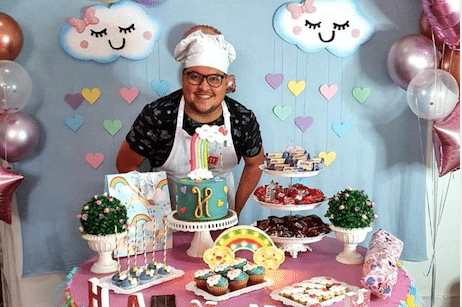
- admin

Axel: "It's not always what happens to us, but how we deal with it."
Axel Rafael Galanton Noriega is the creator of a company based in Lima called Delichef, specializing in artistic confectionery, a wide variety of foods and breads. An entrepreneurship that was born four years ago but began to take shape inside him when he was on vacation in Mexico and saw the incredible range of opportunities for creative cuisine outside his country. It was then that he decided that it wouldn’t take long for him to find the right place to make his passion for cooking his true profession. The vision was realized one year later, the chosen place: Peru.
Noriega faced multiple obstacles and difficulties during this process, although what was most difficult for him was undoubtedly feeling at home as a foreigner. “Anyone would think that if the economic issues are resolved, one is already integrated. It’s partly true, although those of us who emigrate always carry the responsibility of collaborating with our family, so solving the financial situation is not so fast either. But integrating is something else, we also need help with that, because our business can prosper, but without the help I received from IOM, with its training programs and the seed capital, I think it would have been more difficult for me to integrate”.
For Axel, it was this help that allowed him to organize his ideas and focus on what was truly important: interacting with the new community to which he now belonged. He used the IOM training to meet this challenge. He felt strengthened by the sessions of mentoring for professional and personal development, which enabled important advances that served to promote his entrepreneurship. “Since the first mentoring sessions, I have experienced a feeling of peace, which I knew very well where it came from: for the first time I was aware that it is not what happens to us, but how we deal with what happens to us. Also, to feel that things do not happen only to us. Often, when you start a business, you may feel overwhelmed by events, but the truth is that just as we learn marketing strategies or economics to develop a business, in the same way, we must learn to free ourselves from the thoughts that don’t serve us, and use those that make us feel passion for what we do as gasoline. This is the only way we can move forward.”
For this young Venezuelan entrepreneur, the key pillars at the center of his young company will guide his path forward. “I realized that I needed to focus and organize my ideas, which, although they were correct, did not follow a work pattern, something necessary although there is a lot of creativity at stake. Another thing that I began to conquer is giving myself a space to start learning, no matter what because what I get is time for myself and nurturing my creativity. Many times, we get so stuck in our business that we feel we are lost, but if we stop, look around, get some air and continue, everything improves. And finally, I am learning to develop patience and to understand that achievements are not always immediate, but if you do your best, they always come.”
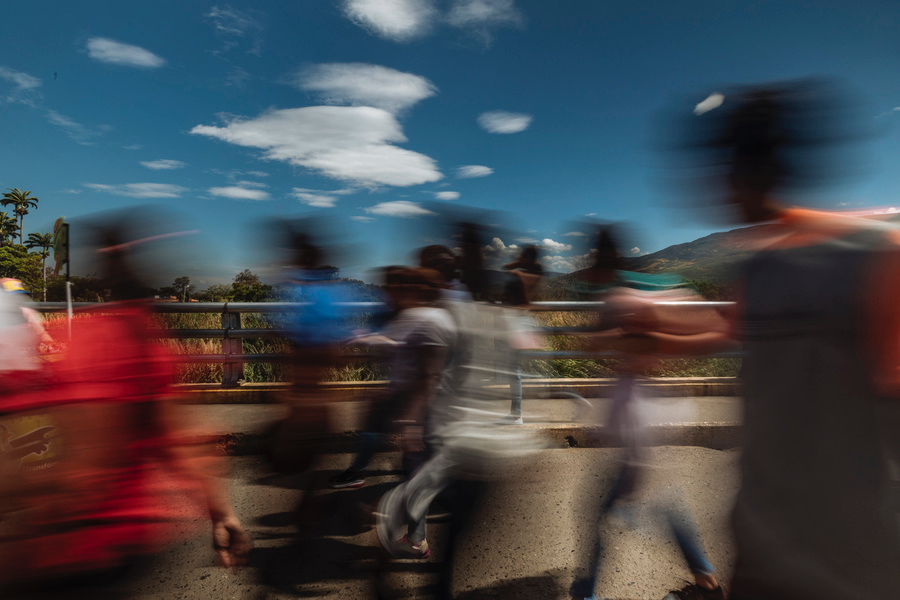
- admin

Ronald: "When you arrive to a new country you ned people to trust you"
Ronald Silva is an expert in soil science and crop production born and raised in Venezuela. When he made the decision to migrate to Peru, he struggled to find his place in this new culture and economy. After five years in his new country, Ronald and his wife decided together that starting his own business was the right path forward. After considering different options, he saw a fantastic opportunity in making and selling cuisine from his native land. He started making traditional tequeños, typical appetizers of Venezuelan cuisine and the dough for empanadas, as cuisine of the country where he was born was gaining fame beyond its borders.
At first, Ronald sold the food ready-to-eat, but when his frozen menu gradually expanded, he decided that this was the future of his business and wished to put all his knowledge and energy into expanding his frozen food customer base. Yet he still struggled to adapt to his new culture, and to form the meaningful connections needed to become a successful entrepreneur.
Ronald struggled with financial stability as he sought to expand his business, “But there was OIM,” he shares with us, “helping and empowering. I confess that with the way of thinking that we brought from having migrated, it was difficult for me to process the idea that there were opportunities for people who came from other countries. But I understood that we could only get ahead if we learned to use the necessary tools to be autonomous. It was not just about our willpower or race. What the new culture did we had to do as well: then the pieces began to fit together, and the entrepreneur who had always been in me then put together the puzzle. Every entrepreneurship idea has a “how”, a “what for” and a “why”, which must necessarily be known.”
He now runs his frozen food business, Ronnytequeños, from Lima and says access to mentoring aimed at personal, professional, and social development was also “a real discovery”, he tells us. “The whole block of mentoring made me understand -session by session- that on many occasions we perceive ourselves as stagnant when something goes wrong, when the accounts do not add up, when we have to decide on an issue, is because we don’t focus where we should.” Today Roland’s business is very different from what he and his wife had originally conceived, and although they still have a long way to go, he insists: “We will always be infinitely grateful to our mentors, for showing us the way to commercial success, from the implementation of key skills in finance, marketing, product, tax issues, but above all because of the trust they helped us gain. Because that’s when you feel that you will be able to achieve your dreams, your goals, and you start to believe in yourself, and you take more steps toward the right direction.”
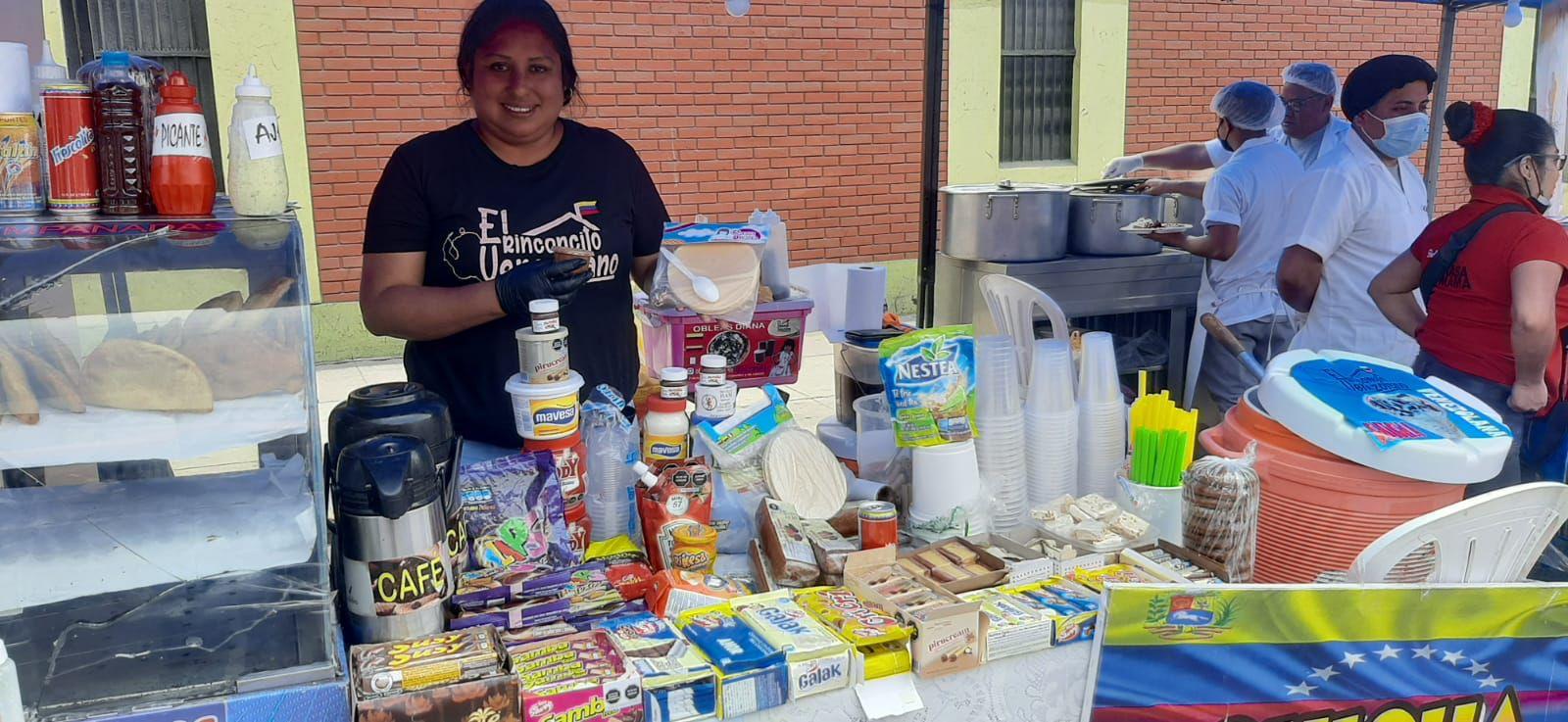
Dayana: “Sometimes life’s ironic”
- admin

Dayana: "Sometimes, life's ironic."
Dayana Rojas, was born in Venezuela, and currently lives in Peru. Dayana tells us: “My ancestors are Peruvian, so we are two generations of migrants between the same countries. This makes everyone in my family feel that we have a double culture because we identify with both nationalities.” According to Dayana, her entrepreneurship has a long history that began when her parents made the decision to return to their country from Venezuela after 43 years. The yearning to return home led this chemical engineer to leave an excellent job in one of the main petrochemical companies to migrate to Peru, although it took a full year to complete the journey. In 2018, when the family was reunited in Peru, Dayana decided to start selling the same confections her father sold back home, Venezuelan chicha. She bought the necessary tools and equipment to make this very familiar treat which is a drink containing rice, milk, sugar and a vanilla base. It requires a two-day production process to achieve the perfect chicha.
“Life’s ironic,” she tells us with a smile, “my father, a Peruvian who learned to prepare the rich and delicious Venezuelan drink, raised his three children in Venezuela thanks to that product, and years later, I do it in Peru”. But for this engineer-turned-entrepreneur, her passion goes beyond chichas. After selling Venezuelan delicacies on the beaches and in schools, in December 2018 she decided that it was time to gather all her products into a single brand focused on Venezuelan gastronomic culture, so she created a name that encompasses everything. Thus, Rinconcito Venezolano was born. The restaurant not only offers empanadas but also small wafers and candies from her country of origin, even sweet sandwiches, desserts and souvenirs. For Dayana, the mentoring for personal and professional development provided by IOM was much more than just support.
It came just at the time when she needed them most. “There were days,” she tells us, “When I would feel so low that I would sit down and procrastinate. I convinced myself to believe that later I would do my duties, but nothing, I had nowhere to get strength. It was as if inside I had never had passion, desire for change, or desire to grow professionally, in short: as if I had never had resources. And worst of all, I felt terribly bad seeing how time was running out for me. After the mentoring, I was able to realize that I was afraid of failing, and it was not something trivial, because the truth is that one of my biggest flaws is perfectionism. Sometimes I think that I do not carry out all my ideas, I am so afraid that it will not turn out perfect that I don’t do it, then I enter a kind of vicious circle, and how does that end? Running out of strength! I am grateful to IOM for the opportunity of joining the mentoring sessions, I keep moving forward, and I manage to do it as I used to, achieving what I set out to do, taking advantage of two of my main strengths: enthusiasm and passion.”
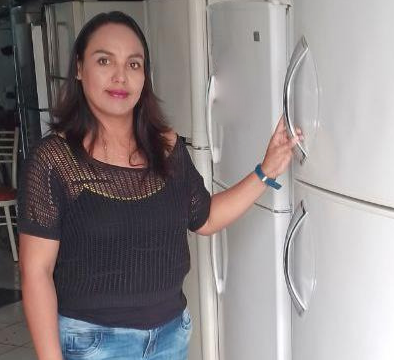
- admin
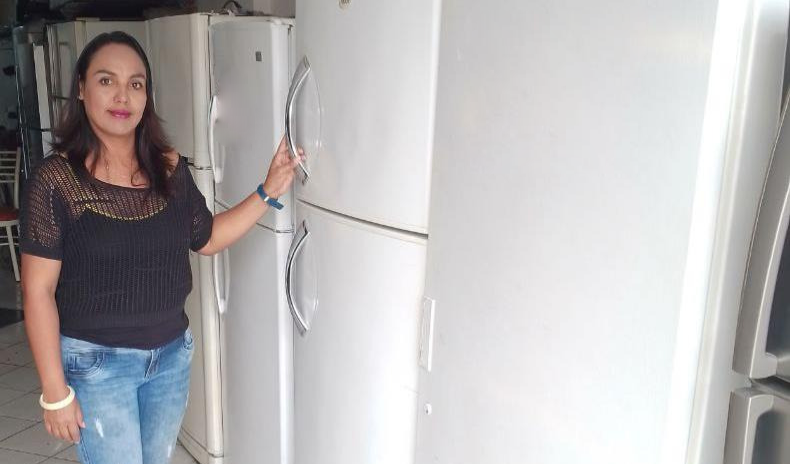
Yexira: a woman entrepreneur working hard to live a better life
For Yexira Yalili Salazar, the four years she has been in business with her partner have been a quite a challenge. The company Multiservicios y Repuestos Construfrío 36, which today has its premises in Lima began “with just a briefcase of tools, a lot of will, perseverance and desire to excel”. In terms of material things, they didn’t have much, except “an alliance between a Peruvian and a Venezuelan, where each one, little by little, contributed new ideas and material and economic resources.”
For Yexira, the only thing that kept them going was faith and the hope that things would improve along the way, a certainty that began to take shape in their country of origin when the economic situation in Venezuela became very difficult. The situation prompted her to move to Peru with her family in 2018 to start a new chapter. “We sold everything we had. Somehow, deep inside me I knew that there was no going back, that it would be a journey that was as long as it was definitive. Fortunately, we were well received” she says, “because I couldn’t work, my three-year-old son was sick with asthma for six months and with a complicated health condition…”
It was not until a year later, through USA for IOM’s training programs for entrepreneurs, and after having acquired the first seed capital, that the business began to improve and to incorporate new services. “In 2020 and 2021 we had other trainings led by IOM and more seed capital,” she tells us. “We were so happy with this new training, we were able to incorporate new business expansion tools, such as identifying potential customers, assessing the competition, suppliers, we learned to do market research, to manage social networks… To say that we are deeply grateful to the whole IOM team isn’t enough. Then came the mentoring sessions, which gave us tools to strengthen ourselves, where we learned personal development strategies, social and professional growth tools to contribute the best of ourselves to the host community. But they were also important as a woman and a migrant, since I have experienced inequality in my own entrepreneurship and work environment. This was the biggest and most enriching challenge I have had in my life because I have learned to improve my self-esteem, to make different decisions and most importantly: to continue looking for new opportunities that improve my well-being. One of the most valuable things I learned during the mentoring is to shape my life with the resources that I have at my disposal, in the place where I am, and with the opportunities that I can get, with the sole goal of being happy and having a better quality of life.”
By: Nora Rodriguez
Essayist and CEO of Architects of Happiness
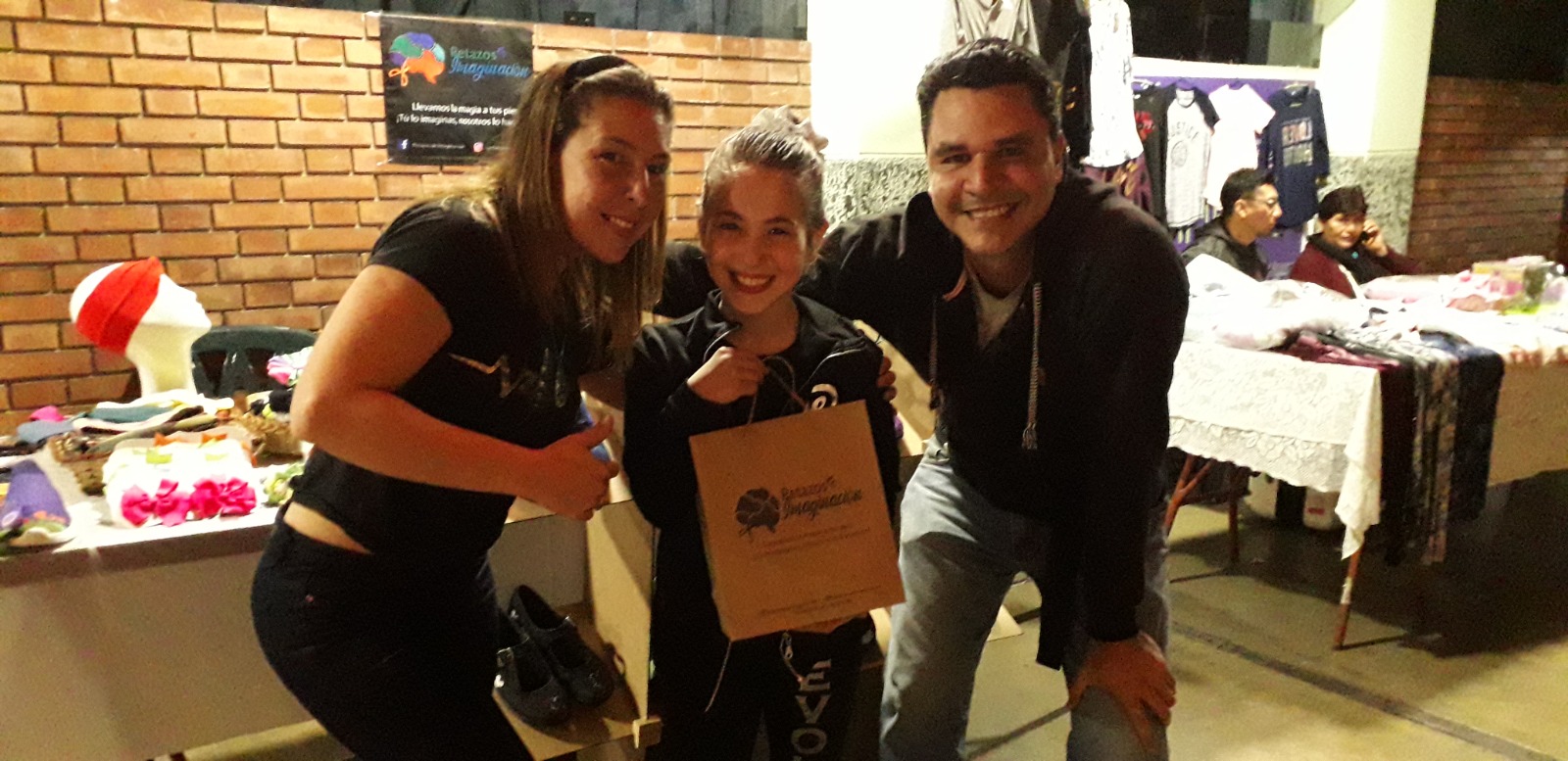
Imagining Something New To Learn And Start Again
- admin
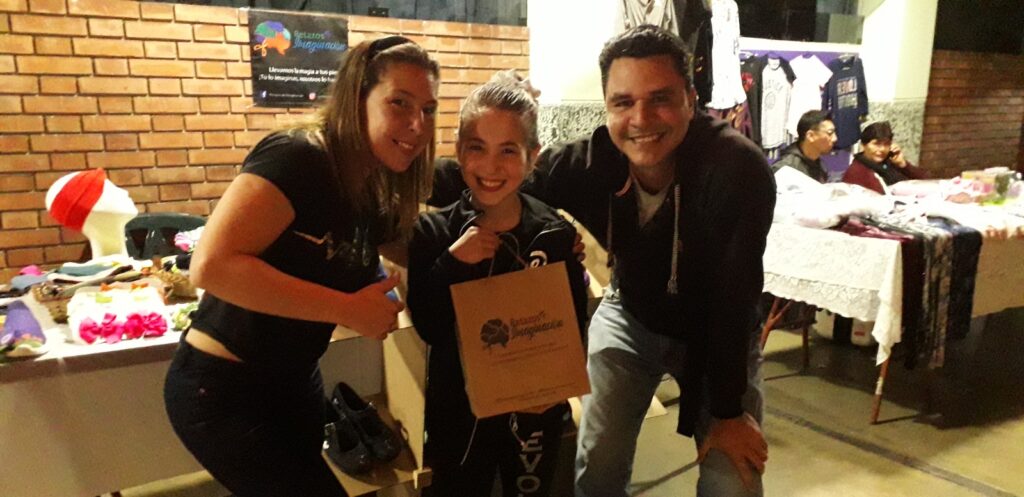
Imagining Something New To Learn And Start Again
When Scarlet Pambianchi decided to take the step of migrating, she did so with great expectations, although she was aware that it would not be an easy path. From the first moment, her inner drive was to give her family a better future, which obviously included financially helping the people who had remained in the country of origin. Although her first destination was Mexico, the unexpected accident of a relative and her complications disrupted all her plans, so she decided to change her destination to Peru, where she wanted to create her own company.
Since her specialty is artistic gymnastics, a friend of hers offered her and her partner to move to the city of Lima to work in the sports area, with an interesting economic offer. But when they arrived at their destination, her promise was diluted, and after discovering that nothing was as she had been promised, she decided to focus on the idea of creating an entrepreneurship with more persistence.
Scarlett was aware that her own business had to be something as necessary as it was original, so when she saw clearly that her entrepreneurship would be focused on handmade footwear, her project began to take shape minute by minute. She tells us how even starting from the ignorance of her field, the exploration was fascinating to her, since it united those components that are fundamental for her: illusion, imagination and creativity. However, she and her partner soon realized that they needed training to really shape the business idea they both had.
“And IOM has been a blessing with its comprehensive training, from how to start and improve a business, to financial education, and mentoring for socio-emotional strengthening. Because many times we think that an entrepreneurship refers only to the fact of producing, of being only aware of the financial aspect, that what is produced is everything, and it turns out that sometimes it is overlooked that, as migrants, internally we remain empty , and thus there are no forces for entrepreneurships. That’s why I appreciate the integration of mentorships so much! And not only because it made me see that to sustain a business it is necessary to start from the heart, but because I am convinced that this is the best medicine we have ever had”.
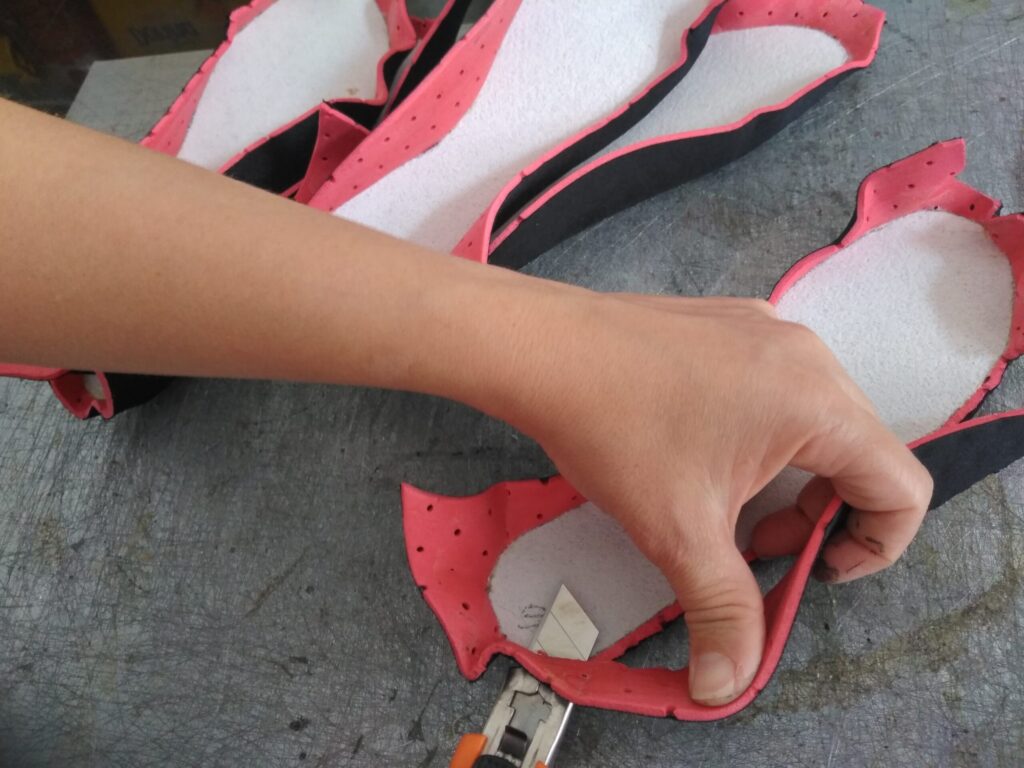
Scarlet’s company is called Retazos de Imaginacion S.A.C. It specializes in manufacturing handmade shoes with personalized designs, and it is, as its creators say, 80% handmade, but 100% impregnated with love.
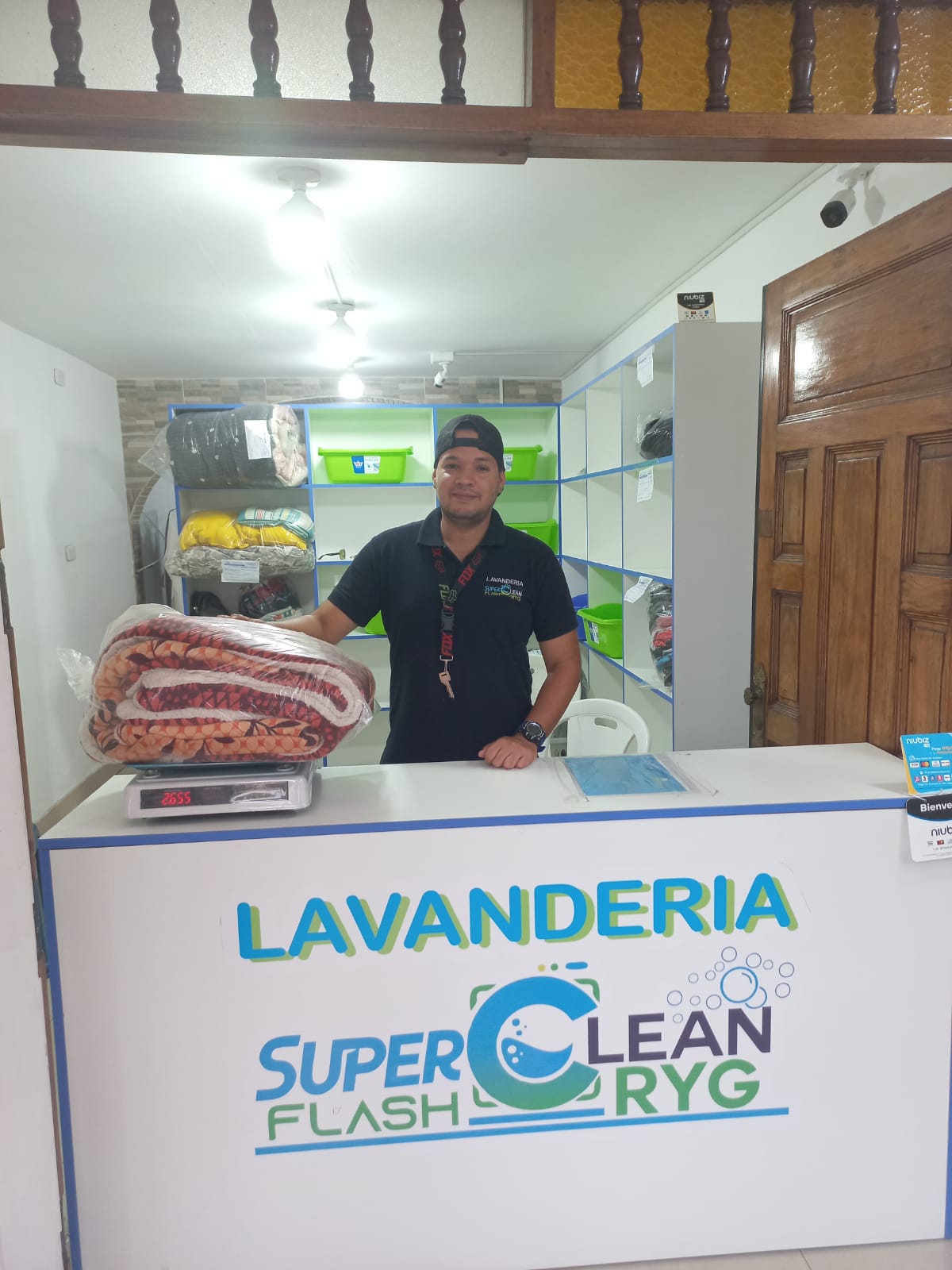
Creating Good Connections To Expand A Business
- admin
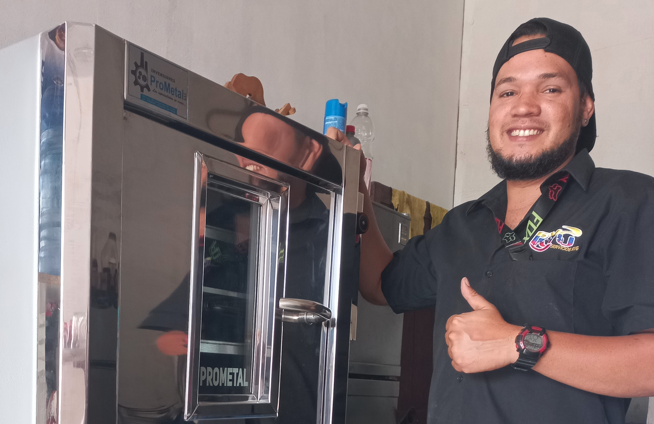
Creating Good Connections To Expand A Business
For Gustavo Alejandro Herrera, the decision to migrate was not an easy one. It took him a year of reflection to leave a large part of his family in Venezuela. From his first company in Trujillo, Cambios RYG, destined to send remittances to his country, he felt valued and respected by his neighbors, although the first few months were economically complicated. The most important thing in that early period was saving money, so for six months he restricted himself to eating practically everything, except the essentials, unlike the way of life he was used to.
Having set a goal helped him to apply it to his company as well. His growth strategy was to set small goals and meet them under any circumstances. Gustavo is convinced that entrepreneurships have to somehow show the values of its manager. That is why he wants his clients to feel that being Venezuelan has education as a mark, and he considers it essential for business.
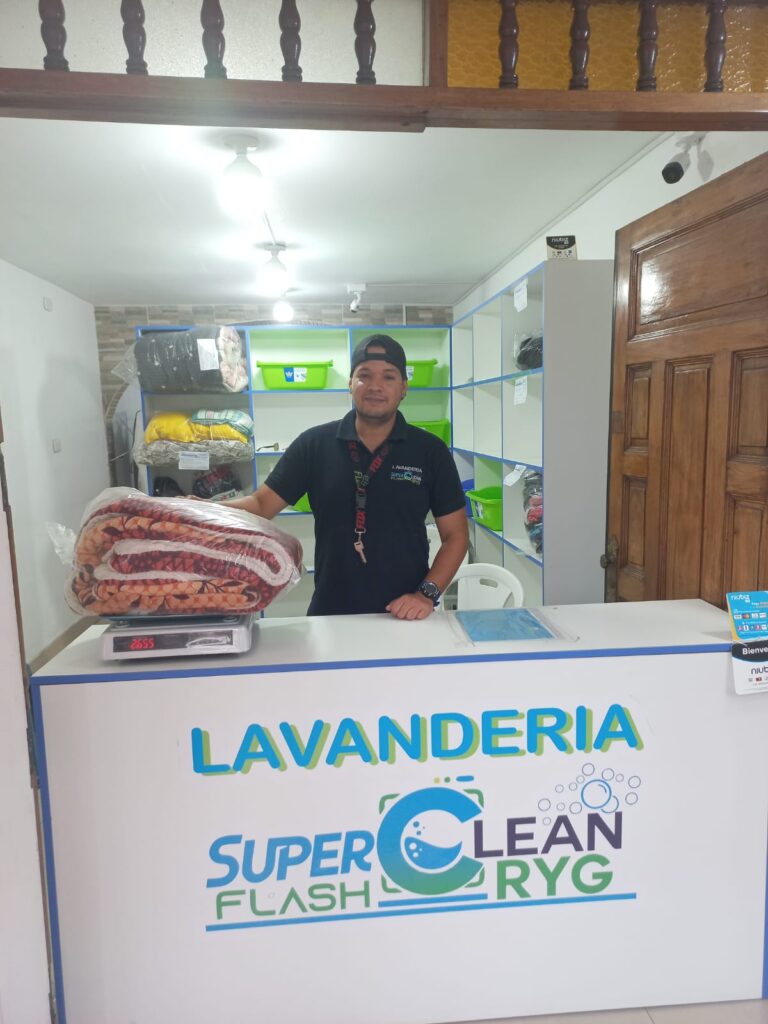
And not only because he considers that in certain areas it is not enough to work hard and make an effort, but that more values must be provided, such as honesty or sincerity. “No one likes,” he says, “when the person you give your money to send to another country doesn’t act politely and seriously. I understand how you may feel, because if I can help my family myself I will feel good, but that does not mean that I give my savings to just anyone.”
For Gustavo, joining the IOM program was the springboard he needed for basic issues such as learning how to legalize businesses in another country, in addition to other basic strategies.
However, for him it has been essential to strengthen himself to handle difficult situations, as he learned with mentoring.
“I realized that to endure a business, the strong ties that are within us are as important as the new ties with people whom you share with day to day, so I try to break the prejudices that exist with Venezuelans” .

For Gustavo, social intelligence is key for business, and he defines himself as a person willing to help, be respectful and collaborate with the people around him. He believes that this makes a difference when there are strong migration processes. Gustavo has decided to create another business that also benefits local people, so he has just opened a laundry, Lavandería Super Flash Clean RYG, and has the serious intention of opening two more soon, although “step by step”, as he says.
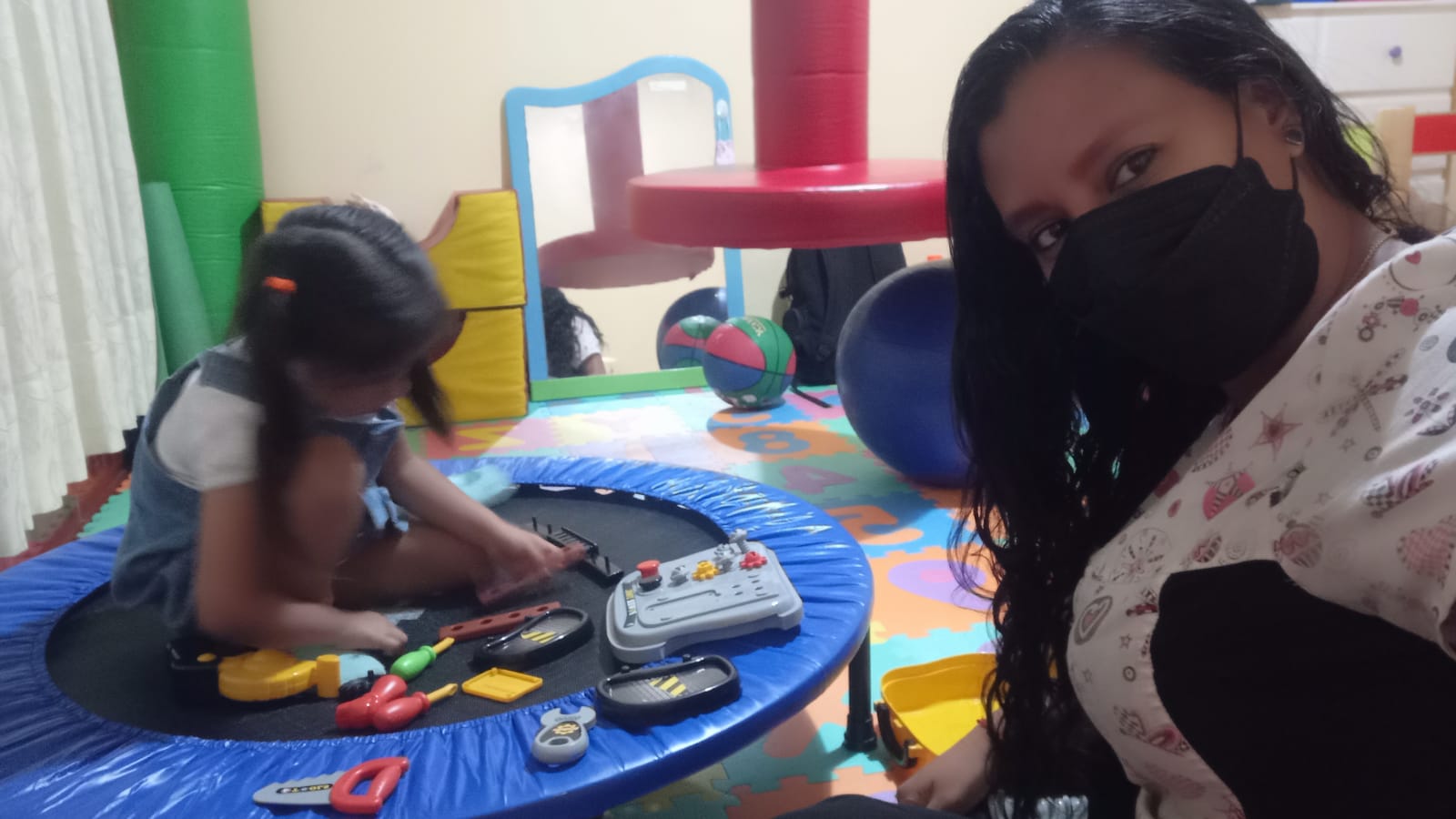
Creating An Entrepreneurship To Improve The Lives Of Others
- admin
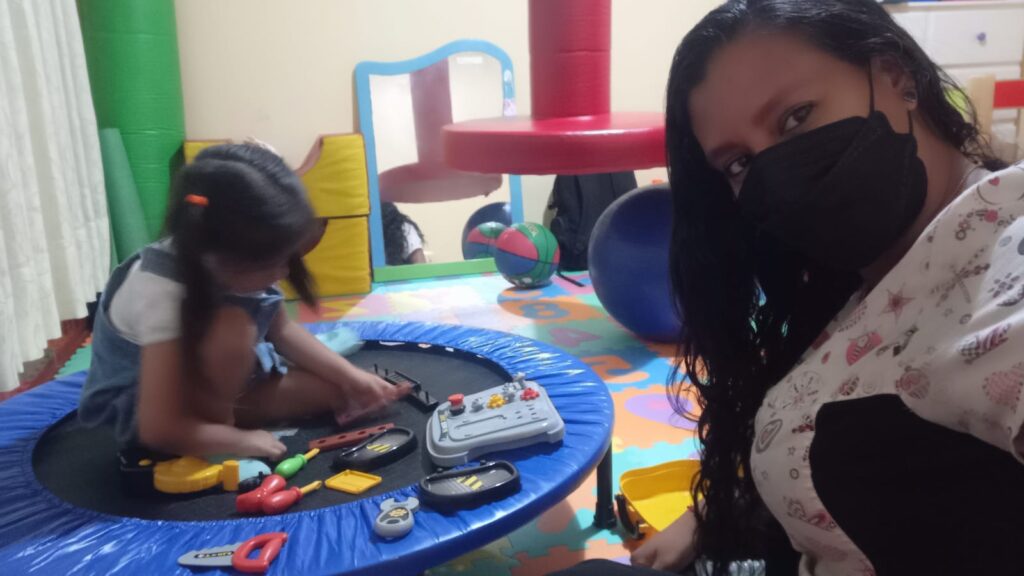
Creating An Entrepreneurship To Improve The Lives Of Others
Erika Beatriz González Correa created Therapy Dec, a business born from a personal purpose and a professional goal: to help people improve their life quality through physical rehabilitation and recovery. “When I studied Physiotherapy and Occupational Therapy, I already knew that I would do a service job, and now I have the commitment to make a positive impact in the lives of my clients, this time, in Lima, Peru”. From the first moment Érika knew that although she would have to overcome some initial challenges, such as getting her clients to trust her knowledge and experience, at a time when the mass migration of Venezuelans was increasing, she would have to continue working internally to face the fear of rejection, that it would still be there, even if things went well.
It was a Peruvian colleague who, without Erika looking for it, helped her make herself known, she helped her demonstrate that she knew how to relieve pain and rehabilitate. From that moment on, her company specialized in older adults, although the pandemic and total confinement forced her to assume the desertion of many of her clients, who could no longer seek services due to the risk of contagion.
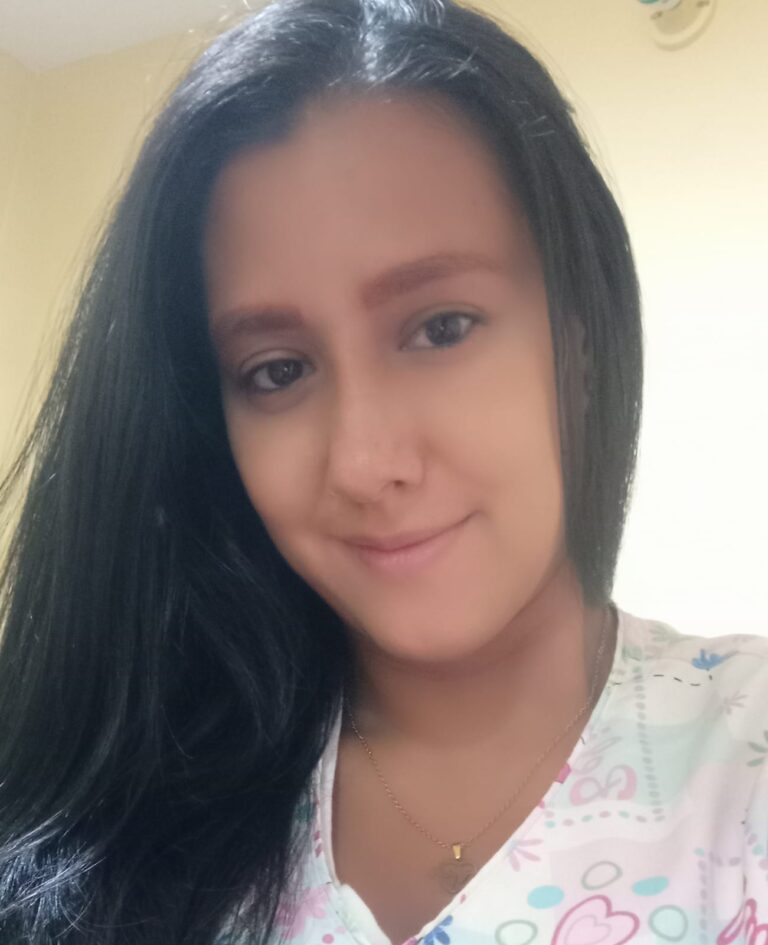
“With this pressure, I remember that I kept thinking over and over again: a Venezuelan woman in Peru, facing a pandemic with confinement like everyone else, the only option left for me was to think and reflect on what capacities I had internally to find an solution.”
Eika began to put into practice new resources, methods and strategies to unlearn everything that she felt was limiting her. “I decided to reinvent myself,” she tells us. “Simply put, I felt like the only option I had was to sell tissues to people who were crying, instead of sitting down and crying myself.”
At that precise moment, she recounts that she received one of the best gifts of her life: an invitation to participate in the IOM business strengthening program for migrants. “Who would think? In a foreign country, support was given to those of us who came from another place…” For the physiotherapist, it was not only the managerial knowledge she learned, but for her entrepreneurship, was the recognition of her values, capacities and how to strengthen their vision of caring for other human beings through mentoring.
What IOM was providing was much more than accounting or organizing. “I gained strength and personal appreciation at a very difficult time” she tells us, “but the most important thing is that thanks to it I managed to be a better businesswoman, mother, daughter, wife, and a better person every day to provide each one of my clients the best I have”. And she continues: “the mentoring provided me with so many valuable tools that seemed especially made for me, and this made me a better person, and with each client I intend to do my best so that they can feel that they made the best decision by choosing me as their therapist. I know that I not only help them recover from an injury, but that I also seek to help them from a human perspective, as life has helped me since I arrived in this wonderful country.” Today Therapy Dec continues to grow not only in clients but also generating jobs so that more people can improve their quality of life.

